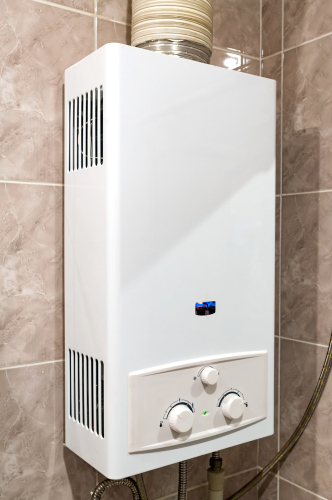https://old.rosieonthehouse.com/faqs/the-pros-and-cons-of-tankless-water-heaters
The Pros and Cons of Tankless Water Heaters
Water Heater Maintenance & Care
All over Europe and Asia, Tankless Water Heating has been used for decades. This technology has now made its way to the United States.

Tankless water heaters, also known as instantaneous, continuous flow, inline, flash, or on-demand, heat the water only when you need it. A big tank full of water in your garage or laundry room is not needed. When a faucet is turned on, the tankless water heater simply turns on a heat exchanger or heating coils as soon as it detects water flow. When the faucet closes, the coils automatically turn off. It only takes about five seconds for the tankless water heater to heat up water for use.
Pros of a tankless water heater:
- Utilities - Tankless water heaters can be powered by gas or electricity.
- Energy Efficient – because they do not heat water until you turn on your hot water faucet, they use up to 50 percent less energy than a traditional water heater (tank-style).
- Leak Reduction – traditional water heater tanks store 50-80 gallons of water, and 80 percent of them will leak at some point. Tankless water heaters operate without a storage tank, eliminating thousands of dollars of potential water damage expenses.
- Endless Hot Water – there is no tank capping the amount of water you have available, which means "Bring on those hot showers and long bubble baths!"
- Compact – unlike bulky traditional water heaters, the tankless water heaters have a sleek, wall-mounted design that takes up 80 percent less space.
- Warranties - tankless water heaters feature longer warranties, giving you better protection against defects.
- Lifespan – industry sources report that tankless water heaters may last 20 years as opposed to the typical 10-year life span of a traditional tank unit.
Cons of a tankless water heater:
- Installation – not a job for a DIY person. You definitely need to hire a professional to ensure proper sizing of the tankless unit, as well as venting for gas and safe electric circuit runs.
- Cost – tankless units are an investment that lasts twice as long as traditional units. Simply put, they cost more. Ranging in price from $2,200-$3,600, with varying installation rates.
- Pre-Treatment – due to Arizona's extremely hard water, a water softener must be installed in the home to ensure you get the proper life out of the tankless system.
Home Maintenance To-Do | #WaterHeater
###
Photo Credits:
- Shutterstock
RELATED CONTENT:
- Blog: Tuning Up Your Toilet
- Blog: Replacing Water Supply Lines
- Blog: All About Garbage Disposals
- DIY FAQ: Water Treatment Consumer Guide
- DIY FAQ: There's a Water Heater Revolution Going On!
- Podcast: Preventing Plumbing Disasters
